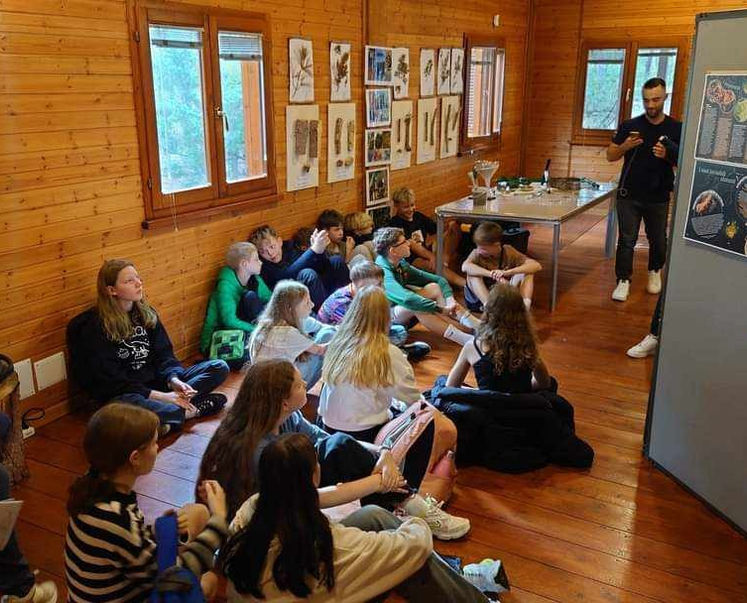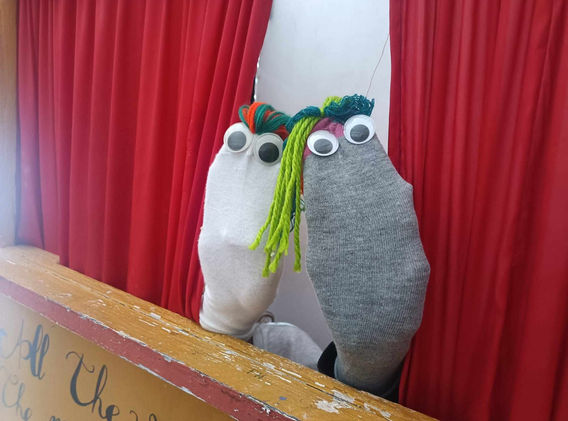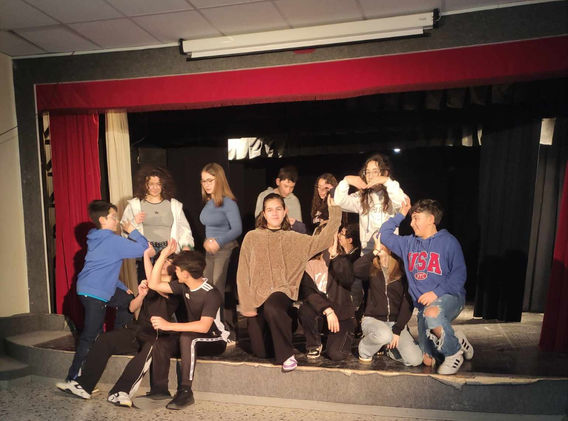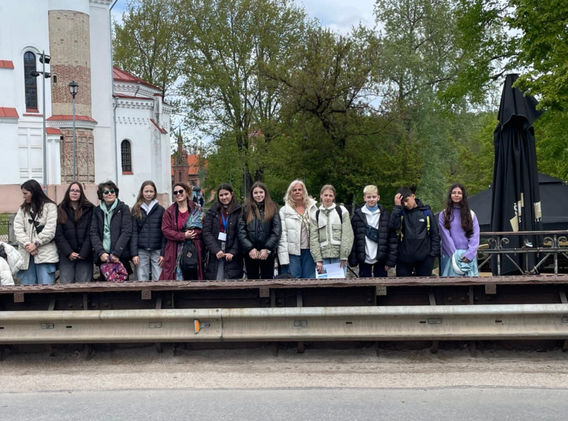
Discovering Sardinia: Cultural Differences Through Students’ Eyes
On 20-26th October, 2024 6th graders from President Valdas Adamkus Gymnasium travelled to Italy, Sardinia under the Erasmus + KA121 program (no. 2024-1-LT01-KA121-SCH-000215452) to get to know another culture, make new friends, visit unique places of this island, taste traditional dishes and learn traditional dances. It was not only a valuable educational experience, but also a cultural adventure and an opportunity to learn more about the traditions of this special island.The students were pleasantly surprised by the warmth, kindness and care of the families, surrounded by love and attention. In Sardinia, families often maintain a strong bond and community spirit, which can appear to guests as an extremely warm and sincere way of life. Such an experience can undoubtedly enrich children - not only broadening their world view, but also understanding how language and culture can create a sense of belonging, even when the environment is different from their own. Italians are really very warm people, especially towards children. By staying with families, the sixth formers not only improved their English but also picked up a few words or phrases in Italian.In the modern education system, technology and innovation are becoming an integral part of the educational process. In Sardinia, Italy, a school called ISTITUTO COMPRENSIVO ANTONIO GRAMSCI, in order to integrate modern teaching methods, organized an unusual English lesson for sixth graders, combining robotics and language learning. This method not only helped improve language skills, but also developed many other skills needed in the XXI century.Modern education is increasingly moving beyond the traditional classroom, giving students the opportunity to learn through experience and a direct connection with nature. One such lesson is an unconventional trip to Platamon, where sixth graders immersed themselves in the natural sciences, observing birds and fish and exploring the soil. This lesson was also integrated into other subjects, such as biology, geography and even literature, and pupils were encouraged to write about their experiences. The aim of the lesson was to develop the pupils' ability to know and explore the processes of nature, and to develop critical thinking, creativity and co-operation skills.The children spent the last day increasing their physical activity by going on a hike around Bramassa Park. The length of the walk was about 7 kilometers. The weather was very kind to the travelers and after walking half the way, the children had a great opportunity to swim in the azure waters of the Mediterranean and even see the octopus swimming live. The guide introduced the children to the ancient forts in the park, explaining their purpose and how the Sardinians tried to save them.The difference observed and identified by the children between the cultures was - time. In Italy, time is more flexible, so lateness is not considered a big problem, and the rhythm of life is freer and slower, with great attention paid to the quality of rest, lunch breaks and time with the family.Family life is also different - Italians often maintain extremely close ties with their loved ones, with family gatherings, lunches or dinners being an integral part of their daily routine. Lithuanian family ties are also strong, but are more often considered a private aspect of life. It may have been difficult for the children to fit into these Italian gatherings at first, but they eventually adapted and accepted it as part of their daily routine.The integration of technology and innovation into the teaching process at the Sardinian school gave students the opportunity to develop skills that are important for the XXI century - problem solving, critical thinking and collaboration. Robotics classes during English lessons were an excellent example of how modern teaching methods can interest children and help them to absorb new information in a practical way.Lessons in nature, for example on Platamon, encouraged pupils to experience the processes of nature firsthand, observing birds and fish, studying the soil. Such experiences not only develop scientific knowledge, but also stimulate an awareness of the value of nature and the responsibility for its preservation. A walk in the Bramassa Park, an introduction to the historical forts and a swim in the Mediterranean gave the students invaluable impressions.
ImpreSsıons from sardınıa
UNFORGETTABLE EXPERIENCES OF STUDENTS MOBILITY IN SUNNY CAXIAS (November, 2024)
The recent mobility project in Caxias, Portugal, provided an enriching, multicultural experience that combined educational activities, cultural exploration, and environmental initiatives. The program kicked off with a virtual meeting, allowing participants from various countries to introduce themselves, discuss their goals, and share an overview of their local activities. This initial meeting helped students connect and understand the different backgrounds and perspectives each participant brought to the project.
On arrival, the inaugural session set a positive tone for the week. Hosted at São Bruno's School, the welcome event included presentations on local project initiatives, a tour of the school, and icebreaker activities with 7th-grade students, fostering an atmosphere of openness and collaboration. This was followed by a traditional Portuguese dance workshop, where participants learned the steps of the “Regadinho,” immersing themselves in the local culture. In celebration of St. Martin’s festivity, students took part in a drama workshop, which offered them the chance to creatively express themselves while learning about Portuguese traditions. The day ended with each participant sharing presentations about their home country, engaging in interactive games that built a sense of community and belonging.
The cultural exploration continued with a visit to the historic Mosteiro dos Jerónimos and Padrão dos Descobrimentos in Belém. Participants enjoyed a tasting of the iconic "Pastéis de Belém" and explored the Marquês de Pombal Palace and gardens in Oeiras. These visits provided valuable insights into Portuguese heritage, architecture, and local flavors, enriching students' appreciation for the host country’s history and traditions. Reflective activities during bus rides encouraged students to discuss and share what they had learned.
The mobility program emphasized both physical activity and teamwork. Participants enjoyed an exciting day at Jamor Nautic Center with canoeing classes and mini-golf, which were followed by a shared picnic that encouraged informal socializing. Later, at Parque Aventura in Jamor, students engaged in tree climbing and ziplining, which promoted teamwork, resilience, and confidence-building.
Another highlight of the project was the focus on environmental awareness. A visit to Aquário Vasco da Gama exposed students to the importance of ocean conservation and the biodiversity of marine ecosystems. Inspired by this experience, students participated in a beach cleanup at Caxias, learning hands-on about the impact of litter on coastal environments and the importance of individual contributions to environmental sustainability. This commitment to environmental action continued with a creative workshop at Quinta Real de Caxias Garden, where students explored the local horticulture and expressed themselves through artistic activities.
The mobility week concluded with a comprehensive tour of Lisbon, where participants explored iconic sites including Cais do Sodré, Praça do Comércio, São Jorge Castle, Praça da Figueira, Rossio, and the Elevador de Santa Justa. This immersive city tour allowed students to experience the vibrant culture of Lisbon while reflecting on the week’s learning experiences. The program wrapped up with a farewell meal featuring Portuguese cuisine, where certificates of participation were awarded to commemorate the students' involvement and achievements.
Throughout the week, participants developed new friendships, improved their communication skills, and deepened their understanding of both cultural diversity and environmental stewardship. This mobility experience in Portugal left a lasting impact, equipping students with valuable insights and skills that will inspire their future academic, personal, and professional journeys.
"Exploring Sustainability and Cultural Heritage: A Student Mobility Experience in Catania, Sicily"
From 31st March until 4th April, a group of 12-year-old students from President Valdas Adamkus Gymnasium participated in an Erasmus+ mobility in Catania, Sicily. This enriching experience aimed to deepen students' awareness of the Sustainable Development Goals (SDGs), particularly those related to environmental sustainability, healthy nutrition, and the importance of physical activity and psychological well-being.
Throughout the mobility, students engaged in interactive workshops, outdoor activities, and collaborative projects that emphasized eco-friendly practices, balanced diets, and active lifestyles. They also developed essential communication skills by working in diverse groups, fostering teamwork and a strong sense of team spirit.
One of the highlights of the mobility was the Kindness Room activity, where students engaged in exercises that promoted kindness, empathy, and effective communication. These activities allowed students to build stronger relationships with their peers while exploring the importance of social cohesion and emotional intelligence in educational settings. Students also had the chance to participate in a physical education session or explore local Sicilian culture through a shopping experience. These activities not only contributed to the physical well-being of the students but also provided insight into the cultural traditions and everyday life of the local community.
The mobility emphasized the integration of digital learning with a session in the computer lab, where participants used interactive tools to explore sustainability topics. By collaborating on digital projects, students gained a deeper understanding of the role technology played in promoting sustainable practices. An exciting part of the program involved the Cooking Lab, where students were introduced to traditional Sicilian dishes made with locally sourced ingredients. The focus on healthy and sustainable food practices highlighted the importance of food security and environmental responsibility. Students not only learned to prepare delicious meals but also gained insight into the benefits of supporting local economies and adopting sustainable food practices.
Exploration of Catania’s city center offered another layer of learning. Participants embarked on a guided tour to discover historical landmarks such as Piazza del Duomo and the Roman Theatre. The tour focused on how Catania’s rich history shaped the city’s current environmental and social landscape, giving students a deeper appreciation of the interconnections between history, culture, and sustainability.
In addition to these educational activities, the program included an excursion to a local beachside location. This reflective tour provided students with an opportunity to learn about coastal conservation efforts and the importance of protecting marine environments. The tour emphasized the need for global environmental protection and highlighted the role each individual could play in preserving natural resources.
A visit to the coastal town of Cefalù added another layer of cultural and ecological learning. During the trip, students explored the town’s historical landmarks and learned about its sustainable practices. The experience also allowed participants to engage with the local community, understanding how sustainable practices were integrated into daily life.
The final sessions of the mobility focused on technological innovation and creativity, as students engaged in a Robotics Lab. Here, they learned how technology could be harnessed to address environmental challenges. By building and programming robots designed to solve sustainability issues, students gained practical experience in combining technology with sustainability.
The Origami Lab offered a quiet, focused opportunity for students to create art with an emphasis on sustainability. By using eco-friendly materials, students not only enhanced their fine motor skills but also explored the concept of resource conservation in art. Music therapy sessions were designed to provide students with a therapeutic space to reduce stress and improve emotional well-being. This form of therapy fostered relaxation, emotional expression, and overall mental health, supporting the students’ well-being during their mobility experience.
Through this diverse and hands-on mobility experience, students not only learned about sustainability and cultural heritage but also developed important life skills such as teamwork, communication, and creative problem-solving. The program fostered an appreciation for local traditions while empowering students to become active participants in global sustainability efforts.
MOMENTS FROM THE MOBILITY
President Valdas Adamkus Gymnasium sixth graders' experiences in Granada, SPAIN
On April 7–11, 2025, 6th grade students of the President Valdas Adamkus Gymnasium, accompanied by teachers E. Sakavičienė and B. Krapauskienė, participated in the Erasmus+ mobility project in Granada, Spain. The visit not only enriched the students' knowledge, but also introduced a holistic approach to education, emphasizing the comprehensive well-being of the student: physical, emotional, social, cultural and academic development. This Erasmus+ project was focused on ensuring that students would learn through experience, strengthen their connection with nature, deepen their understanding of the principles of healthy eating, participate in active activities and develop skills of cooperation, community and independence. Granada is a unique city where nature, architecture, culture and educational progress are in harmony. This environment has become an excellent context for the growth of students.
The first day began with a ceremonial welcome and an introduction to the La Presentación school. The students not only heard about the history of the school, but also took a detailed tour of the entire building – classrooms, creative workshops, sports halls, libraries, laboratory and recreation areas, a church located in the school building, sports fields, an organic vegetable and fruit garden, the delicacies of which are tasted by students, and flower gardens, which are nurtured by former teacher nuns. This was followed by a public speaking lesson, in which Lithuanian students tested themselves by presenting short stories about their hobbies and homeland. In a robotics lesson, the children got acquainted with structural systems and the basics of programming, and in English classes they actively communicated with Spanish peers. The culmination of the day was a feast of hot chocolate and traditional churros, which became not only a culinary experience, but also a cultural discovery.
On Tuesday, the students had an exceptional day dedicated to experimentation and learning through practice. They participated in math, physics, and chemistry workshops, where they conducted experiments, analyzed the results, and learned new teaching methods. There was also a music lesson, where students learned Spanish instruments and learned traditional melodies. Physical education activities were characterized by a happy mood and teamwork - games and challenges encouraged physical activity, communication, and emotional satisfaction. English classes involved creative tasks that not only required vocabulary, but also critical thinking and ingenuity. That day, students felt like real scientific researchers.
Wednesday was dedicated to a cultural introduction to the traditions of Granada. The students participated in the "Holy Week in Granada" cultural tour, which allowed them to get to know Semana Santa - the traditions of Holy Week, which are so important for the people of Andalusia. It was not only an excursion, but also an engaging experience, when the children could observe the preparations for the processions, get acquainted with religious symbols and their meaning in the local culture. This developed the students' intercultural awareness and empathy, developed the ability to appreciate the traditions of other nations and find connections with their own customs.
On Thursday, the students participated in an English language project, during which a trip was organized around the city of Granada, visiting historical monuments. This educational activity promoted not only language skills, but also cultural knowledge - the students explored the famous Alhambra gates, the historic square of Granada, listened to stories about the origin of the buildings and their place in the country's history. At the end of the day, a farewell lunch was held, during which laughter, impressions and promises were heard to meet again. There was a sense of community during the lunch - even a short time can create strong bonds.
The last day of the project ended with participation in the 9th annual charity "Unity". This activity became a real community event - not only all students, but also some teachers and parents took part in the race. The goal of the race - to raise funds to support orphans - gave meaning to the theme of the whole week: each student not only learns, but also grows as a responsible member of society. The achievement of Lithuanian student Urtė - an honorable 3rd place in her age group - also brought great joy to everyone. This achievement symbolizes the determination, activity and sincere involvement of our students.
The Erasmus+ project in Granada was more than a journey for the sixth graders of the President Valdas Adamkus Gymnasium - it was learning differently, when each experience becomes a step towards comprehensive development. The emphasized holistic education model allowed students not only to improve their knowledge, but also to foster emotional well-being, self-esteem, respect for others, healthy habits and a common connection with the world. When they returned, the children brought not only postcards, photos or greeting cards – they returned richer inside. And that is precisely the greatest gift of Erasmus+.
Impressions from Erasmus+ “HB+HP” Project Mobility in Lithuania – A Week That United Hearts and Cultures
From 5 to 9th May, President Valdas Adamkus Gymnasium hosted a remarkable international Erasmus+ “HB+HP” (Healthy Bodies in a Healthy Planet) project mobility, welcoming students and teachers from Portugal, Sardinia (Italy) and Spain. For an entire week, our school community transformed into a multicultural space full of learning, friendship, collaboration, and inspiration.
Monday – First Impressions and New Connections
The week began with a warm welcome at the school. Through various tasks and team-building games, students quickly got to know each other and started building sincere friendships. From the very start, language and cultural barriers began to fade. In the afternoon, our guests explored the historic Old Town of Kaunas, immersing themselves in its culture, architecture, and history.
Tuesday – Discovering the Capital of Lithuania
On the second day, the group went on a meaningful trip to Vilnius and Trakai. In Vilnius, students participated in a city rally, visiting iconic landmarks and learning about the city’s cultural heritage. In Trakai, they enjoyed the stunning natural scenery and explored the famous Trakai Castle. The trip provided a relaxed atmosphere to deepen intercultural connections.
Wednesday – Sustainability and Creativity
Wednesday was dedicated to the school’s traditional event “EKO Ideas for Lithuania,” where our international guests played a key role. They took part in a fair, sold handmade items, joined creative workshops and discussions, and co-developed innovative ideas on promoting environmental awareness and sustainable living.
Thursday – Exploring Lithuanian Heritage
All participants visited the Open-Air Museum of Lithuania in Rumšiškės, where they learned about Lithuanian traditions, crafts, and lifestyle. Educational activities offered a deeper understanding of our national cultural identity and highlighted the importance of preserving one's roots while being open to others.
Friday – Creativity, Smiles, and Farewell Tears
On the final day, students engaged in creative workshops and a fun quiz that reflected the knowledge and experiences gained during the week. In the evening, everyone gathered for a festive farewell full of music, dancing, laughter—and inevitable tears. It was a touching reminder of how fast a meaningful week can pass.
This mobility was more than just a project event—it was a deep human connection, a source of inspiration, a boost in self-confidence, and a powerful lesson in global citizenship. It strengthened international cooperation, broadened participants’ horizons, encouraged linguistic and cultural growth, and—most importantly—left unforgettable memories in everyone’s heart.
We sincerely thank all students, teachers, guests, and community members who made this special week possible. We are certain that this Erasmus+ “HB+HP” project mobility was another step toward a more sustainable, open and united Europe.






































































